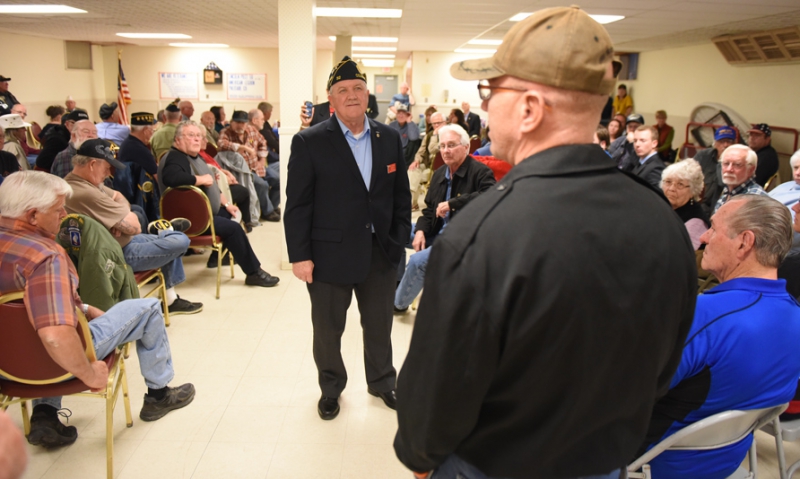
Veterans express satisfaction with VA care, frustration with Choice Program during Legion town hall in Colorado.
Veterans want a health-care system they can call their own and believe the Department of Veterans Affairs is that system. But it is a flawed system right now – especially when it comes to the Choice Program.
That was the general feeling expressed by veterans who attended the April 26 American Legion town hall meeting hosted by Post 50 in Palisade, Colo. Nearly 100 veterans attended the meeting, as did Legion and VA staff, and representatives from U.S. Sen. Michael Bennett and U.S. Rep. Scott Tipton.
The town hall was the first part of an American Legion System Worth Saving visit to the Grand Junction VAMC. Ralph Bozella, chairman of the Legion’s Veterans Affairs & Rehabilitation Commission, said the Legion’s position on VA – and on those wanting to scrap the system and start from scratch – has not wavered.
“There are people out there who want to turn everything over to the private world,” Bozella said. “We don’t think so. I’m a VA patient in Denver. Believe me – we want VA health care. There are problems with it. One of the reasons we’re here tonight is to solve (those problems). We want to stand shoulder to shoulder with the VA … to help all veterans receive quality health care and timeliness of care.”
Grand Junction VAMC Director Marc Magill attended the meeting, as did some of his staff, to “help improve the services we provide at the medical center, and to make our service better for veterans on things we can control, and then help raise awareness about things we can’t,” he said. “It is a system worth saving. I’ve been with VA 31 years. I believe in it. I believe in what we do. I’m willing to open up our organization because I believe transparency and accountability – I owe that to you guys as the leader of that facility."
During the meeting, David Maddox – an Air Force retiree – thanked the Grand Junction VAMC employees in attendance, calling theirs a “thankless job.” He also expressed support for VA.
“The question came up early today: Do we need the VA hospital?” Maddox said. “My answer would be a resounding yes. If you think privatization of the VA is going to help and you’re going to be able to go to a doctor, look at your Choice Program. Choice Program does not work.
“Give the (VAMC directors) the ability to hire doctors. Do whatever it takes. We need to have doctors at the VA hospital taking care of veterans in the VA hospital. This has always been a great hospital. It’s always had a great reputation.”
Another man, a World War II veteran, said, "If it wasn’t for VA I wouldn’t be here. You’re looking at a miracle.” Another said that he’d been to a lot of VA facilities and that Grand Junction’s was by far the best.
Few took issue with the care they’ve received at Grand Junction. Some were frustrated that they’ve had multiple primary care doctors since they started using the facility.
But the common complaint was dealing with VA’s Choice Program. Enacted by Congress in 2015 under the Veterans Access, Choice, and Accountability Act of 2014, the program allows veterans waiting longer than 30 days for care, and veterans more than 40 miles from a VA medical facility or facing severe travel burdens, to seek care outside of VA.
But getting that care requires scheduling through a third party, either TriWest Healthcare or – in the case of the western half of the country – Health Net. Attempting to schedule appointments and then get follow-up information can be frustrating, many veterans said.
One veteran said he didn’t get contacted by Choice representatives until months after he’d been approved to use the program. Another said it took 57 days to get an appointment through the program.
Veterans said they’d never heard back on test results conducted by doctors contracted through the Choice Program. One who was dealing with back pain said he made three different visits to providers before finally being told, “You’ll have to learn to live with it.”
One veteran said he had no problem with the Choice Program, and that he’d been able to schedule and then undergo two surgeries within a matter of weeks. But another was less than enthusiastic. “Choice was set up to fail,” he said. “Why is VA referring us to doctors who can’t handle the extra patients? They’re moving us to the end of the line.”
Magill said veterans aren’t the only ones frustrated with the Choice Program. “Choice is not something that we have local control over,” he said. “If it worked the way it was supposed to, it would be seamless to you, and it would be seamless to my facility. I should not have to have (an employee dedicated to the Choice Program) if this were working correctly. It’s the right thing to do … so I hired additional people. Those folks will work with our veterans to try to navigate through the contract (and) improve something … that they should not have to help with. I share your frustration about something I have no control over locally.”
- Veterans Healthcare

